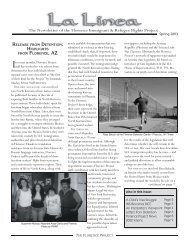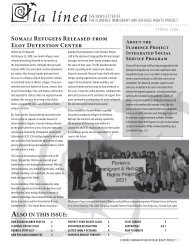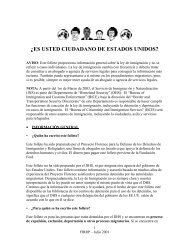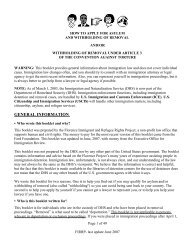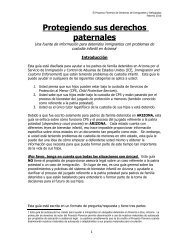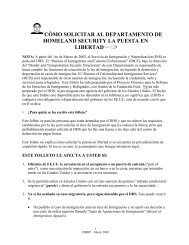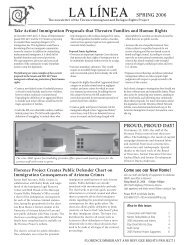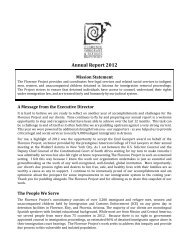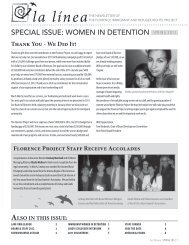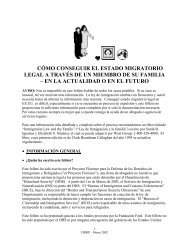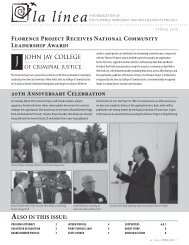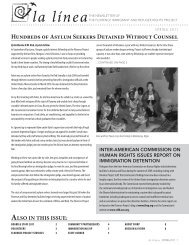quick reference chart and annotations for determining immigration ...
quick reference chart and annotations for determining immigration ...
quick reference chart and annotations for determining immigration ...
Create successful ePaper yourself
Turn your PDF publications into a flip-book with our unique Google optimized e-Paper software.
Aggravated<br />
Felony<br />
CMT<br />
DRUG<br />
DV<br />
CHILDREN<br />
FIREARMS<br />
Aggravated Felony, defined at 8 U.S.C. § 1101(a)(43)(A)-(U). The aggravated felony<br />
definition includes twenty-one provisions that describe hundreds of offenses, which need<br />
not be aggravated or felonious. Aggravated felons under <strong>immigration</strong> law are ineligible to<br />
apply <strong>for</strong> most <strong>for</strong>ms of discretionary relief from deportation including asylum, voluntary<br />
departure, <strong>and</strong> cancellation of removal. Conviction of an aggravated felony triggers<br />
m<strong>and</strong>atory detention without bond pending deportation. A conviction <strong>for</strong> illegal reentry<br />
after deportation or removal, in violation of 8 U.S.C. § 1326, will carry a significantly<br />
higher federal prison term if the defendant was previously convicted of an aggravated<br />
felony. See 8 U.S.C. § 1326(b)(2). See Note: Aggravated Felony<br />
Crime Involving Moral Turpitude (CMT). A crime involves moral turpitude if it<br />
involves fraud, or it comes within a vague definition of involving evil intent or deviating<br />
from accepted rules of contemporary morality. Here, moral turpitude is defined according<br />
to federal <strong>immigration</strong> case law, <strong>and</strong> not, e.g., state cases on witness credibility or<br />
disbarment. For CMT determinations, see comments on individual offenses in this <strong>chart</strong>.<br />
A noncitizen is deportable who (a) is convicted of two CMT’s, which are not part of a<br />
“single scheme of criminal misconduct,” at any time after being admitted to the U.S. or<br />
(b) is convicted of one CMT, committed within five years of admission to the U.S., that<br />
carries a potential sentence of at least one year. 8 USC § 1227(a)(2)(A)(ii) <strong>and</strong> (i). A<br />
noncitizen is inadmissible if convicted of one CMT, unless he or she qualifies <strong>for</strong> the<br />
petty theft or youthful offender exception. To qualify <strong>for</strong> the petty theft exception, the<br />
person must have committed only one CMT, which has a potential sentence of not more<br />
than a year, <strong>and</strong> a sentence of not more than six months must have been imposed. To<br />
qualify <strong>for</strong> the youthful offender exception, the person must have committed only one<br />
CMT. 8 USC § 1182(a)(2)(A)(ii)(II) <strong>and</strong> (I). See Note: CMT.<br />
Controlled Substance offenses. A noncitizen is deportable <strong>and</strong> inadmissible if convicted<br />
of an offense “relating to a controlled substance (as defined in section 802 of Title 21).”<br />
There is an exception to the deportation ground, <strong>and</strong> a waiver of inadmissibility, <strong>for</strong><br />
conviction of a single offense of possession or being under the influence of marijuana or<br />
hashish. To be deportable, the person must have been convicted after admission to the<br />
U.S. 8 USC § 1227(a)(2)(B)(i) (deportability), 8 USC § 1182(a)(2)(A)(i)(II), (h)<br />
(inadmissibility waiver). In many cases, the record of conviction must identify the<br />
specific controlled substance involved in order <strong>for</strong> the crime to have <strong>immigration</strong><br />
consequences. See Note: Controlled Substances <strong>and</strong> comments on individual offenses.<br />
Crimes of Domestic Violence, Stalking, Violation of Protection Order, Crime of<br />
Child Abuse, Neglect or Ab<strong>and</strong>onment. A noncitizen convicted of one of these<br />
offenses, or who is the subject of a court order finding certain types of violations of a<br />
domestic violence protective order, is deportable under 8 USC § 1227(a)(2)(E). A crime<br />
of domestic violence is defined as a “crime of violence” against a current or <strong>for</strong>mer<br />
spouse, cohabitant, person sharing a common child, or any other a person who is<br />
protected from the defendant’s acts under the domestic or family violence law. See Note:<br />
Domestic Violence <strong>and</strong> individual offenses in this <strong>chart</strong>.<br />
Firearms offenses, A noncitizen is deportable under 8 U.S.C. § 1227(a)(2)(C) who at any<br />
time after admission is convicted “under any law of purchasing, selling, offering <strong>for</strong> sale,<br />
exchanging, using, owning, possessing, or carrying, or of attempting or conspiring to<br />
purchase, sell, offer <strong>for</strong> sale, exchange, use, own, possess, or carry, any weapon, part, or<br />
accessory which is a firearm or destructive device ….”. See Note: Firearms.<br />
iv



